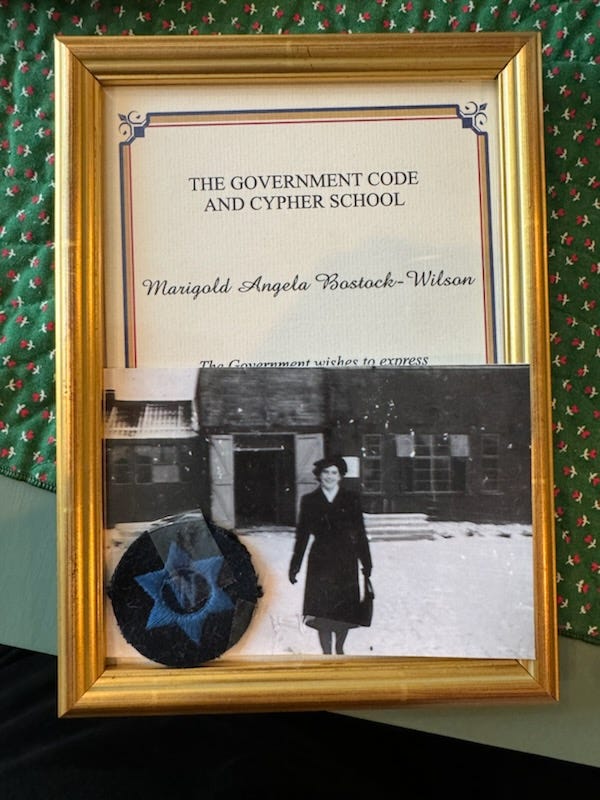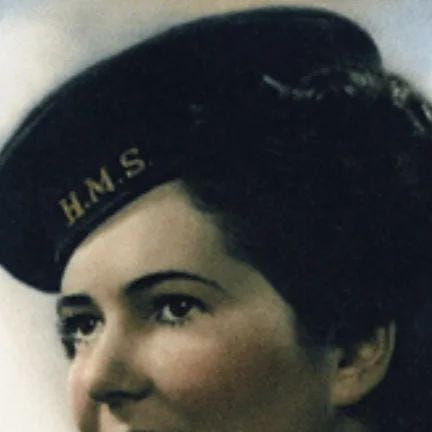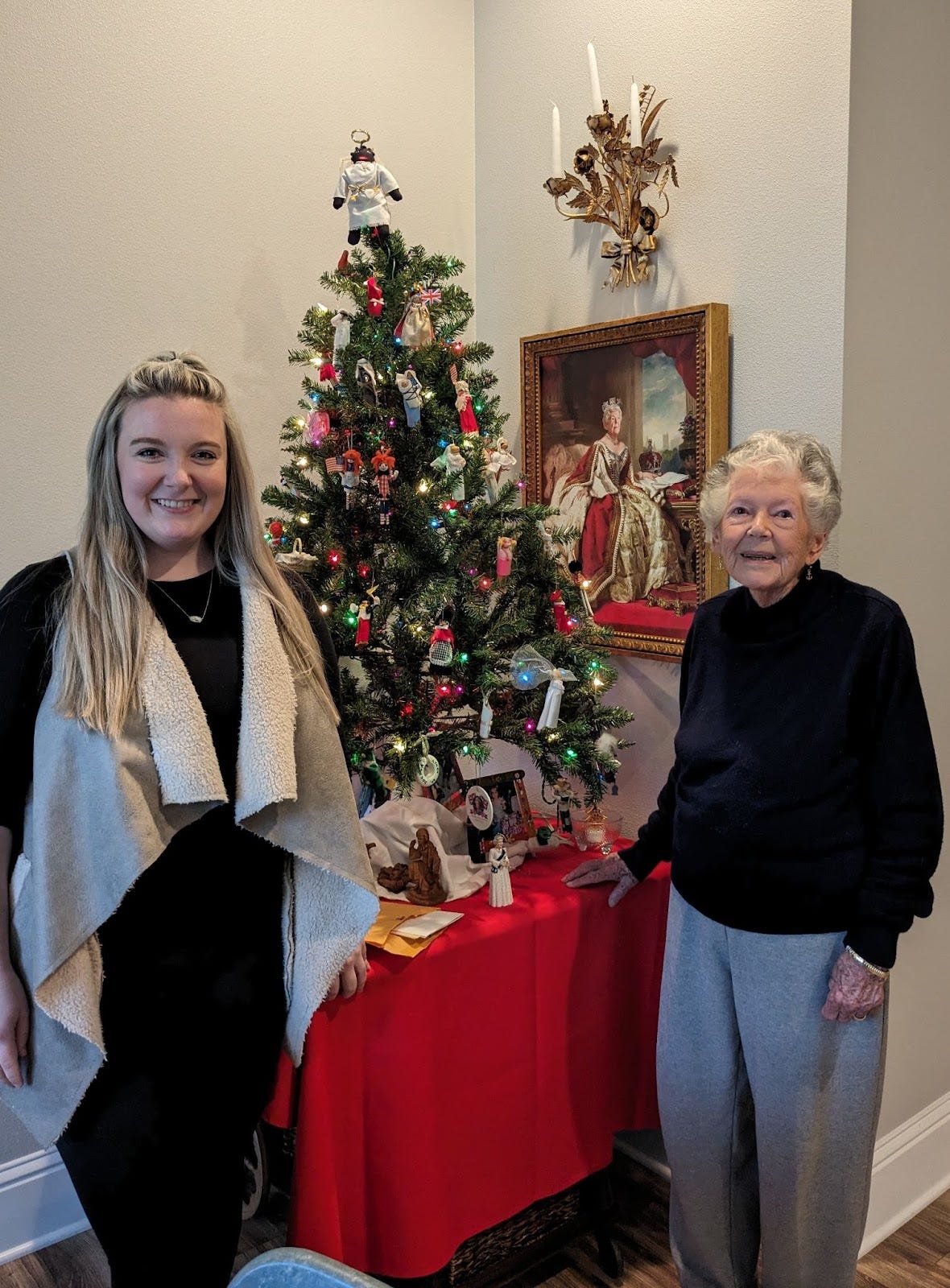My relationship with studying World War II has been one of an organic nature. I have no familial connection and, honestly, just sort of happened upon the field and connected with it. I couldn't quite put my finger on what drew me to the subject matter until I was well into the World War II studies graduate program at ASU. With my background being in artifacts, wishing I knew the stories these inanimate objects could tell, it struck me… the connection was emotion. History, albeit factual by nature, does not have to be void of emotion. Connecting with people and telling their stories as truthfully and honestly as possible cannot be done without also sharing the emotion and hoping somebody connects to it. So, when I found Marigold McNeely, purely by chance, it felt like a full-circle moment.
I was working on a Testimony Tuesday post for our Instagram account where we highlight one specific person and their story. I first typed in Alan Turing* and thought while his story is incredibly important, it is fairly well known. So I dug a little deeper, ended up on the National World War II oral histories archives website, and typed in ‘Bletchley Park’*. The only name that popped up was Marigold McNeely; I listened to her hour-long interview and was immediately inspired. (The museum interview is linked at the end of this post.) I wrote a brief synopsis on Instagram and then something struck me, that last name McNeely. I suddenly thought to myself, I've heard that name before. So I dug back through my mental rolodex and realized that was the last name of my friend Rebecca’s mother who happened to be one of my husband's clients at a car dealership he worked at. (It's ALL connected.) So on the off chance, I texted my husband and asked him to see if he could verify the connection. Lo and behold Marigold ended up being Rebecca’s grandmother, affectionately known as Granny.
With a tightness in my chest (of pure excitement might I add) I sent Rebecca a text and tried to remain as calm as possible, knowing there was a potential opportunity to speak to such an incredible and inspirational woman. She was able to set something up. A week later my mum and I sat down with Rebecca at Marigold's dining room table for a cup of tea, some homemade cucumber sandwiches with Scottish shortbread biscuits, and had a captivating chat. We discussed Marigold's life, her work during the war, the shocking way she found out about the quiet declassification of Bletchley Park and how everything came to light about her work of such great national importance and what that meant outside the context of the war.
I arrived at Mrs. McNeely's house with, admittedly, incredible anticipation and nerves. I had never interviewed anyone before let alone somebody with a connection to the war. Looking back I think the nerves solidified why I wanted to dig deeper into her story, because of my background and all the hands-on tangible experience with unique artifacts and a desire to learn, understand, and know the stories behind these objects. And what better way to do that than go straight to the source.
My mom and I sat down with Marigold and started with a casual conversation. We spoke about the dogs we all owned, hers being a Frenchie named Maggie. A little bit about her 30-acre farm which she and her husband happily lived on till he passed and the quarter horses and Great Danes she raised/showed. Once the kettle had boiled and the tea was served, we sat down at the dining room table and had the most amazing conversation about her participation in WWII. Even though I had some questions prepared, the conversation took on a life of its own. It no longer felt like an interview, with the pressures of making sure no details were left out, but became what felt like a chat among friends over a cup of tea. Marigold speaks of her time at Bletchley with a twinkle in her eye, even though the specifics are a bit foggy at this point in her life. It's interesting because that is not necessarily all due to the passage of time, but due to the threat of repercussion from the gun on the table next to the pen she used to sign the secrecy act. She recalls that moment with clarity and realized that the work she was about to partake in at Bletchley Park was of such great national importance that she resigned herself to never telling anyone. Recounting her time at Bletchley, Marigold said how she was trained to work on the Bombe machines and that it was mandatory to be at least five foot four inches to reach the top of the machine. Much of the specifics are lost to time but she remembers working in Hut 11 and receiving specific menus containing instructions on how to program the machines on each shift. The instructions included where to meticulously plug each wire in the back of the machines which were incredibly loud. Although when one suddenly stopped, it meant that the code had been broken for that day. Everyone let out a cheer of excitement for their success when that occurred even though they did not know exactly what had happened because the information would then go to another hut for decoding. I was curious if she had met Alan Turing to which she replied she hadn't officially but remembered seeing him riding his bike around the grounds of Bletchley with a gas mask on to help with his hay fever (allergies). Also that he used to chain his tea mug to the radiator because he didn’t want anyone stealing it!

She and her other friends, whom she still speaks to, have all said that not talking about their work for so long essentially ensures everything gets forgotten. Marigold then went on to say that one day out of the blue she got a phone call from one of her friends who was flabbergasted that someone had spilled the beans. They had written a book about what went on at Bletchley. After some digging, the ladies found out about the quiet declassification of Bletchley and that they were free to discuss their time there and what duties they had performed but no one had ever contacted them directly about it. Many of the ladies never told anyone because that was all they had known, including Marigold whose mother passed away without ever knowing about the work she did during the war. That is a moment that really resonated with me. I couldn’t imagine not being able to tell the people closest to me about what I did on a day to day basis or for work. It’s moments of perspective like this that really depict how truly different life was for those during the war. The level of personal accountability to ensure the safety of not only yourself but for the soldiers at war and quite frankly the entire country.
Ultimately, this experience is something I wish everyone could partake in. I felt incredibly honored listening to Marigold tell her own story. It was such a visceral experience that has created a real passion within me to continue bringing WWII into the modern day. The war had an immense impact on not only social contexts, infrastructure, and politics but also on the people who had to reintegrate back into society. Their trans-generational legacies pass through families and influence different aspects of their lives in ways that may not be fully known.

P.S. I must confess, I was so enthralled in the conversation that I neither recorded it nor took notes (aside from the mad scramble of scribbling down anything I could remember when I got back in my car post interview) but Marigold had some fabulous memories and snippets that made everyone at the table chuckle. A few are how when the American GIs got to Bletchley to help with the decoding process, the Brits described the Americans as overpaid, oversexed and over here. She also mentioned that on her occasional days off with friends they would head into London to dance and they never forgot their keys, purses, and gas masks.
Listen to Marigold’s oral history in the Digital Collections of the National World War II Museum.
—
Notes:
*Alan Turing, often considered the father of modern computer science, was famous for his work developing the first modern computers, decoding the encryption of German Enigma machines during the second world war, and detailing a procedure known as the Turing Test, forming the basis for artificial intelligence.
*Bletchley Park is an English country house and estate in Bletchley, Milton Keynes (Buckinghamshire) that became the principal center of Allied code-breaking during the Second World War.






Very good job. Your enthusiasm is commendable and I look forward to reading more, I assume there are other writers involved. Reminds me of how I got started doing this, and how you making the connection with Marigold shows how much serendipity plays in preserving history.